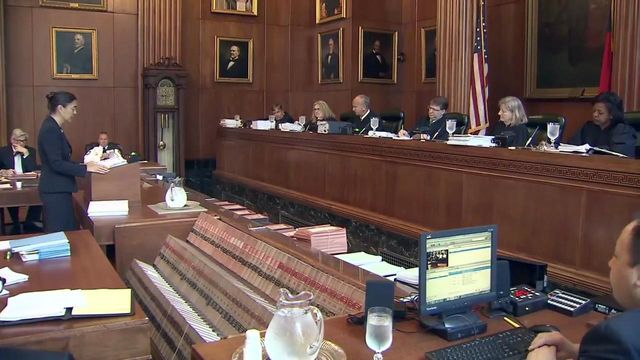High court weighs voting maps, government power struggle
The North Carolina Supreme Court on Monday heard arguments in two cases involving the other two branches of state government.
Posted — UpdatedMichael McKnight, an attorney for legislative leaders, said there was nothing left for the court to decide since the 2011 maps would never be used again and the plaintiffs had already lost the argument before the state Supreme Court.
"If the plaintiffs here have a problem with the new districts," McKnight told the justices, "we contend they would need to file a new lawsuit because this case is over."
Lawmakers last year redrew the congressional map, and the new districts were used in the November election. The General Assembly is now trying to meet a court-ordered deadline of this Friday to get new legislative maps in place.
Justice Robin Hudson noted that the U.S. Supreme Court remanded the entire case to state court, not just the parts that were overturned on the federal side, so the court needs to take some action.
Special Deputy Attorney General Alec Peters, who was defending the state in the lawsuit, and attorneys for the plaintiffs agreed that the Supreme Court should send the case back down the line to the trial court judges for further action. Peters said the lower court should just enter a judgment for the plaintiffs, while the plaintiffs' attorneys said the court needs to address state constitutional issues.
"This is a case where it is important that it be made clear that the rights of the plaintiffs were violated by the initial maps and that, ultimately, a remedy is put in place that fully cures that violation and itself does not violate any state constitutional provisions," said Anita Earls, executive director of the Southern Coalition for Social Justice, who represents the plaintiffs.
Because the legislative maps haven't been approved and the partisan approach lawmakers used to draw the congressional map – and is now using for the legislative maps – could be thrown out by the U.S. Supreme Court in the future, the case isn't really over yet, Earls said.
"I urge you not to abandon these plaintiffs midstream," she said. "The erroneous trial court decision under federal law cannot be left standing."
Separation of powers question
The court also heard the first of Gov. Roy Cooper's two lawsuits against legislative leaders, who he alleges have usurped some of his power.
Citing a ruling the Supreme Court made last year in support of then-Gov. Pat McCrory in another power struggle with state lawmakers, Jim Phillips, an attorney for Cooper, said setting up an eight-member Board of Elections & Ethics Enforcement that is evenly divided among Democrats and Republicans and which has a Republican chairman during every major election doesn't give the governor enough control over an agency that carries out an executive function.
As an example, Phillips said, Cooper has called for a longer early voting period at more available sites, while the GOP-controlled legislature has pushed for more restrictions on early voting. Without the ability to appoint a majority of state and local elections boards, it becomes more difficult for the governor to achieve his goal, Phillips said.
"For agencies that have final executive authority ... the governor must be able to control the views and priorities of a majority of people on that board," he said. "The majority of people on that board have to reflect his views and priorities."
Noah Huffstetler, an attorney for legislative leaders, said gubernatorial control of executive agencies is "an aspirational provision" that can't always be followed in the real world. Giving Cooper such authority would truly threaten the separation of power in North Carolina's government, he said.
"He claims that he must have the power to completely control people who would work in his administration so that they are robotically inclined to follow his views and priorities," Huffstetler argued. "He leaves no room for those persons to honestly consider, 'That's not what the General Assembly meant. That was not the legislative intent behind this statute.'"
There was no word on when the Supreme Court would issue a decision in either case.
• Credits
Copyright 2024 by Capitol Broadcasting Company. All rights reserved. This material may not be published, broadcast, rewritten or redistributed.






